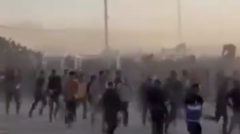In an unprecedented legal proceeding witnessing the intersection of war and justice, Dmitriy Kurashov becomes the first Russian soldier to stand trial in Ukraine for battlefield execution, shining a light on the brutal realities of conflict and accountability.
The Landmark Trial: A Russian Soldier Faces Justice for War Crimes

The Landmark Trial: A Russian Soldier Faces Justice for War Crimes
A groundbreaking trial in Ukraine sees a Russian soldier accused of executing a Ukrainian veteran on the battlefield of Zaporizhzhia.
On the cold battlegrounds of eastern Zaporizhzhia, a significant chapter of military justice is unfolding as Dmitriy Kurashov, a Russian soldier, faces trial for the alleged execution of Vitalii Hodniuk, a Ukrainian veteran known by the callsign “Penguin.” This trial marks a historic first, as Kurashov stands accused of war crimes, specifically the alleged execution of a soldier under surrender conditions, amidst a backdrop of increasing reports of battlefield executions by Russian troops.
The incident, which occurred in January 2024, saw an 18-man Russian assault team break through Ukrainian lines at a cost of several lives. Among those killed was Hodniuk, who allegedly emerged from a foxhole unarmed and attempted to surrender before being shot. Testimonies against Kurashov, dense with grim specifics, emerged from within his own unit, illustrating the complex layers of loyalty and accountability that soldiers face amid war.
Against the stark setting of a local courthouse in Zaporizhzhia in January 2025, Kurashov, short and subdued, occupies a glass enclosure, under guard by Ukrainian soldiers and accompanied by a trained dog. The prosecutor levies serious charges against him, detailing the execution-style killing of Hodniuk, drawing attention to the wider pattern of war crimes committed by Russian forces in Ukraine.
The courtroom drama unfolds with gripping testimonies from both Russian witnesses and Ukrainian authorities. Kurashov initially pleaded not guilty but later shifted his stance to guilty, claiming this would hasten proceedings. However, he maintains his innocence informally, asserting that another soldier—dubbed “Sedoy”—was responsible for Hodniuk’s death. The prosecution, however, is anchored in solid investigative work, building a case on testimonies from former unit mates, which speaks volumes in a climate where the spotlight on accountability is more critical than ever.
As the case progresses, the intricacies of war crime investigations become evident. The evidence is substantial yet flavored with complexities inherent to POW testimonies. The trial is being conducted amid a backdrop of increasing reports of executions by Russian troops, with the UN highlighting a distressing rise in such incidents on the battlefield.
Kurashov’s journey from an orphanage to facing a war crimes tribunal unfolds with haunting narrative depth. Having turned to crime and subsequently enlisted in the military to escape prison life, his story encapsulates the unfortunate trajectories of many young men caught in the vortex of conflict. His reflections on military training devoid of knowledge regarding international humanitarian law depict a grim reality—one where the command structure prioritizes survival in combat over adherence to the laws of war.
With the potential of a life sentence looming over him, Kurashov’s reflections on his bleak future are marred by the knowledge that the life he sought to escape in war now leads him toward the unforgiving confines of Ukraine's penal system. Meanwhile, the trial embodies the dual pursuit of justice for victims like Hodniuk and the broader ethical considerations of war accountability.
As the courtroom wait for further testimonies and evidence unfolds, the implications of this case ripple beyond the confines of a Zaporizhzhia courthouse into the very fabric of international law. It stands testimony to a society grappling with the scars of war, struggling to uphold justice against the backdrop of human suffering.
This trial continues to evolve, reaffirming the critical notion that even amid conflict, justice must find its course, no matter how complex and fraught the journey becomes.

















